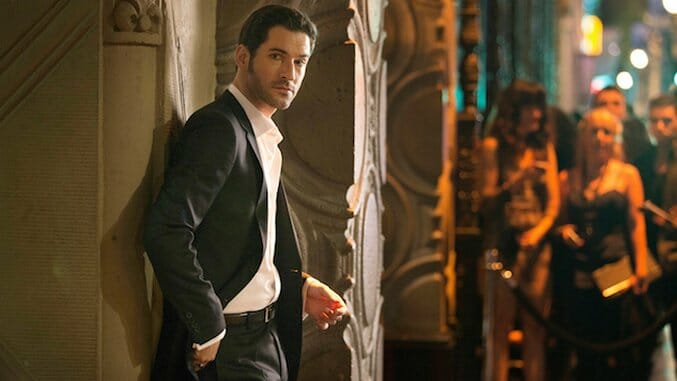The Inspired Comic Book Adaptation of Fox’s Lucifer
Fox
Let’s go ahead and get the “devilishly good” pun out of the way right here. If you’re not burned out on procedurals (or watching it already), you’d almost certainly enjoy Fox’s Lucifer: It’s smart, funny, savvy and actually a joy to watch, rare praise for a TV series that follows the threadbare formula of a cop solving murders.
What you might not know is that Lucifer is based on a comic book. (Yeah, that’s right—not even the tried-and-true police procedural can escape the grasp of the comic book industry these days.) Fox has always been good at mixing genres to create something fresh, from The X-Files (aliens and agents!) to Bones (quirky science and police!), and Lucifer is, in this vein, a case study in how to adapt a comic book mash-up.
In a lot of ways, comics are tailor-made for TV. They’re serialized (much like television), and broken into smaller, episode-sized issues. It’s also a proving ground for what types of stories people are interested in following. Even if we’re not talking about capes and cowls, shows like The Walking Dead and iZombie are proof positive the medium is ripe for exploration (or exploitation, depending on your take).
You literally can’t change the channel nowadays without running into a series based on a comic book, It’s a long list: In addition to the aforementioned pair, The Flash, Arrow, Gotham, Daredevil, Jessica Jones, Supergirl, Luke Cage, and Wynonna Earp, are based on comics, and the list is by no means exhaustive. Most of these series (understandably) wear their comic-book roots on their sleeves, and for the most part, it works.
Lucifer is a different beast. The hit series is based on a character co-created by acclaimed comic writer and novelist Neil Gaiman, first introduced in Gaiman’s seminal graphic novel The Sandman. The king of Hell turned out to be a hit supporting player, and he eventually spun off into his own solo series, which follows Lucifer (Tom Ellis) as he heads for L.A. with his demon pal Mazikeen to run a piano bar called “Lux.” For TV viewers, that sounds pretty familiar, right? Well, that’s pretty much where the similarities end.
-

-

-

-

-

-

-

-

-

-

-

-

-

-

-

-

-

-

-

-

-

-

-

-

-

-

-

-

-

-

-

-

-

-

-

-

-

-

-

-








































